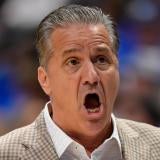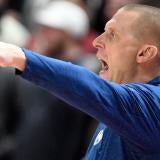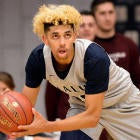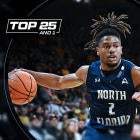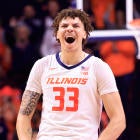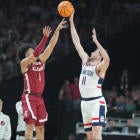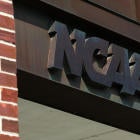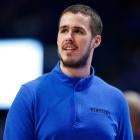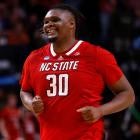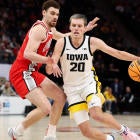NEW YORK — The father of prized recruit Brian Bowen II testified he was given $1,300 by former Louisville assistant Kenny Johnson in the summer of 2017, as the college basketball corruption trial continued Tuesday.
The money, given to Brian Bowen Sr. outside his Galt House residence in Louisville, was tied to Bowen II's commitment to U of L. Bowen Sr. testified that, at a prior meeting at a gas station on June 26, 2017, Johnson was unaware of any payments expected from him to Bowen Sr.
Bowen Sr. said under oath that Johnson "was flabbergasted, he was shocked" that Bowen Sr. was expecting money from Johnson and, by proxy, the University of Louisville.
The prosecution wrapped its questioning of Bowen Sr. by establishing a timeline of events as they pertain to the case.
The meeting, and much of the money in this case as it has to do with Bowen Sr., was facilitated by aspiring sports agent Christian Dawkins, one of three defendants in this trial.
Bowen Sr. testified that he had a "bat phone" that wasn't registered in his name and that he used to communicate with Dawkins.
The prosecution played wiretapped phone calls and showed text messages between Dawkins and Bowen Sr., one of which read from Dawkins to Bowen Sr.: "You about to get money. You about to get some racks."
This text came prior to Bowen Sr. receiving $19,500 from financial adviser Munish Sood in a New Jersey corporate park parking lot in July 2017.
Defense attorney Steve Haney, who is representing Dawkins, went hard at Bowen Sr., who said he couldn't recall certain things, like whether Oregon assistant coach Tony Stubblefield gave Bowen Sr. $3,000 in cash while on an unofficial visit to Eugene, Oregon. Bowen Sr. said he "did not recall with Oregon" any money exchanges and said the same of UCLA.
Bowen Sr. also said he couldn't recall ever talking to former Oklahoma State assistant Lamont Evans about money, but did acknowledge an offer for $150,000 for his son to play at Oklahoma State was conveyed via Dawkins. The defense established that Creighton, DePaul, UNLV and Oregon were schools seriously considered by Bowen II and his father, who testified that his son ultimately had control over where he decided to go to college.
The defense is in the process of trying to establish that Bowen Sr. accepted money long before the FBI's case began -- making him ineligible retroactively and therefore not defrauding the schools. There's no question here that Bowen Sr. had his hand out; it's a matter of if any federal laws were violated by him doing so, and if not, then who was victimized?
Haney also established -- going off Bowen Sr.'s testimony -- that Bowen Sr. accepted thousands of dollars at different points to get his son to play for different grassroots teams and La Lumiere Prep. This included former NFL player Tai Streets paying Bowen Sr. $5,000 in cash for Bowen II to play for Chicago-based Mean Streets program.
Bowen Sr. testified to accepting $8,000 from Shane Heirman, the former La Lumiere coach who is now an assistant at DePaul, which was heavily involved on Bowen II's recruitment. Bowen Sr. also said he accepted $1,500 from former Mean Streets coach Tim Anderson, who is also on staff at DePaul.
DePaul, Oregon, Creighton -- and all of the schools who have been brought up in this trial -- are yet to bring punitive action on any members of their coaching staffs.
Chris Rivers, who is on paid leave from his grassroots executive role at Adidas according to a source, gave Bowen Sr. $4,000 in order for Bowen II to play for the Michigan Mustangs, Bowen said on Tuesday, affirming his testimony from earlier in the trial. In a separate transaction, Rivers also gave Bowen Sr. $2,000. By accepting this money, Bowen Sr. acknowledged he knew that, at the times he took the cash, he knew he was breaking the rules.
Bowen Sr. testified that he initially lied to the FBI in September 2017, when the case became public. He said he did that to avoid getting his son, and others, in trouble. Bowen Sr. officially struck a deal in January 2018 to be a government witness, avoiding prosecution in the process.
"I still think my son is a victim, and I always will," Bowen Sr. said.
Things got tense on Tuesday when Haney began to dig on in Bowen Sr.'s history of tax evasion -- Bowen Sr. said he's working through that now -- and alleged welfare fraud.
"That's enough of that," Judge Lewis Kaplan snapped at Haney.
From there, things only got more interesting in cross, as Merl Code Sr. -- a longtime judge in South Carolina -- crossed Bowen Sr. Code Sr. is representing his son, Merl Code, in the trial.
"Isn't it true that, because of your son Tugs' talent, you have been pimping your son since he was 15 years old?"
The prosecution instantly objected, and with that, the defense rested in its cross examination of Bowen Sr. He was the star witness for the prosecution in this case, and his testimony undeniably brought more questions to college basketball.
The day wrapped with the government bringing in Carrie Doyle, a senior compliance director at NC State, for direct examination. Former NC State player Dennis Smith Jr. and his family have been alleged to receiving $40,000 while Smith played at NC State.
The prosecution established the parameters of college eligibility and NC State's due diligence to prevent any wrongdoing by Smith and his family prior to, and during, his enrollment at NC State. When Doyle was asked if she knew of a $40,000 payment -- allegedly facilitated via an Adidas consultant and unnamed NC State assistant coach -- to Dennis Smith Sr., she responded, "I have no knowledge." Doyle will continue under cross on Wednesday morning.
The lifespan of the trial appears to be on an accelerated schedule. The prosecution said Tuesday that it expects on resting by Oct. 17 at the latest, and the defense responded to Judge Kaplan that it would need four days at most for its side. The case is expected to be in the hands of the jury by the week of Oct. 22.








